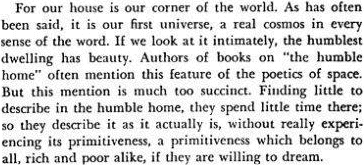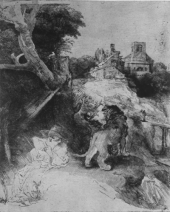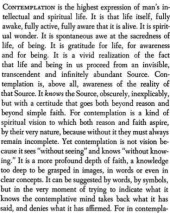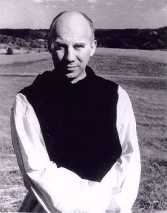| Jim Anderson's Back Pages Page 1 | People | Books | Bella & Zoey's Blog | Jim's Computer Tech Blog Page 3 - Influential Books Since retirement I have gone somewhat mad in my reading, making impossible to keep this page current with the dozens of books I "dip into" weekly, sometimes daily. If I ever slow down and decide to update this page, I suppose I will, otherwise not. For what it is worth. | ||||||
|---|---|---|---|---|---|---|
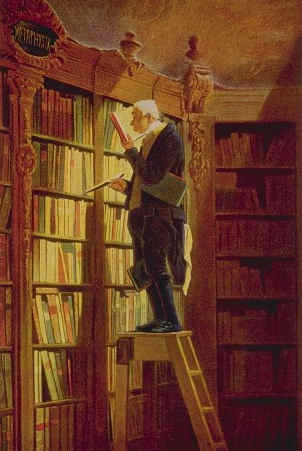 Der Bücherwurm by Carl Spitzweg | 
| |||||
| Non-Computer Related Books I am Currently Reading | ||||||
 |
| |||||
| Some of the Most Memorable Books in My Life (in no any particular order) Not listing the poetry, which I will have to get around to doing someday, but just to mention a few influential poets: | ||||||
| Outline of History H. G. Wells |  I got this wonderful (if flawed in many ways) work as part of a Doubleday Book Club sign-up package back in the 4th or 5th grade. Its virtue at the time was to open the doors for me to the human story with a vividness such that some of the images are still fresh today. A shorter version (A Short History of the World) of the Outline is available at Bartleby. Here is a extended quote: "Xerxes passed into Europe, not as Darius did at the half-mile crossing of the Bosphorus, but at the Hellespont (= = the Dardanelles). In his account of the assembling of the great army, and its march from Sardis to the Hellespont, the poet in Herodotus takes possession of the historian. The great host passes in splendour by Troy, and Xerxes, who although a Persian and a Barbarian, seems to have had the advantages of a classical education, turns aside, says our historian, to visit the citadel of Priam. The Hellespont was bridged at Abydos, and upon a hill was set a marble throne from which Xerxes surveyed the whole array of his forces. And seeing all the Hellespont covered over with the ships and all the shores and the plains of Abydos full of men, then Xerxes pronounced himself a happy man, and after that he fell to weeping. Artabanus, his uncle, therefore perceiving him" the same who at first boldly declared his opinion advising Xerxes not to march against Hellas" this man, I say, having observed Xerxes wept, asked as follows: '0 king, how far different from one another are the things which thou hast done now and a short while before now I for having pronounced thyself a happy man, thou art now shedding tears.' He said: 'Yea, for after I had reckoned up, it came into my mind to feel pity at the thought how brief was the whole life of man, seeing that of these multitudes not one will be alive when a hundred years have gone by.[ 1] This may not be exact history, but it is great poetry." I got this wonderful (if flawed in many ways) work as part of a Doubleday Book Club sign-up package back in the 4th or 5th grade. Its virtue at the time was to open the doors for me to the human story with a vividness such that some of the images are still fresh today. A shorter version (A Short History of the World) of the Outline is available at Bartleby. Here is a extended quote: "Xerxes passed into Europe, not as Darius did at the half-mile crossing of the Bosphorus, but at the Hellespont (= = the Dardanelles). In his account of the assembling of the great army, and its march from Sardis to the Hellespont, the poet in Herodotus takes possession of the historian. The great host passes in splendour by Troy, and Xerxes, who although a Persian and a Barbarian, seems to have had the advantages of a classical education, turns aside, says our historian, to visit the citadel of Priam. The Hellespont was bridged at Abydos, and upon a hill was set a marble throne from which Xerxes surveyed the whole array of his forces. And seeing all the Hellespont covered over with the ships and all the shores and the plains of Abydos full of men, then Xerxes pronounced himself a happy man, and after that he fell to weeping. Artabanus, his uncle, therefore perceiving him" the same who at first boldly declared his opinion advising Xerxes not to march against Hellas" this man, I say, having observed Xerxes wept, asked as follows: '0 king, how far different from one another are the things which thou hast done now and a short while before now I for having pronounced thyself a happy man, thou art now shedding tears.' He said: 'Yea, for after I had reckoned up, it came into my mind to feel pity at the thought how brief was the whole life of man, seeing that of these multitudes not one will be alive when a hundred years have gone by.[ 1] This may not be exact history, but it is great poetry." | |||||
| The Art of Thinking Ernest Dimnet | 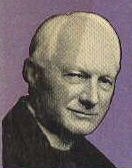 A book (first read sometime in HS and revisited once or twice a decade since) that opened up the questions of the meaning of consciousness, the value of thought, and the richness of possibilities for the inner life. Asserts that the mental/intellectual life is largely made up of images and that the quality of one's life is very largely determined by the quality of those images. Some quotes: "The happiness of most people we know is not ruined by great catastrophes or fatal errors, but by the repetition of slowly destructive little things." "Children have to be educated, but they have also to be left to educate themselves." A book (first read sometime in HS and revisited once or twice a decade since) that opened up the questions of the meaning of consciousness, the value of thought, and the richness of possibilities for the inner life. Asserts that the mental/intellectual life is largely made up of images and that the quality of one's life is very largely determined by the quality of those images. Some quotes: "The happiness of most people we know is not ruined by great catastrophes or fatal errors, but by the repetition of slowly destructive little things." "Children have to be educated, but they have also to be left to educate themselves." | |||||
| Collected Short Stories Flannery O'Connor |  O'Connor captures the something in her short stories contact with the uncanniness of human existence, the misery of falleness and the mystery of grace, in a way that moves you to say, "how can anyone have expressed this?" Here is a short documentary on her life and work on YouTube. O'Connor captures the something in her short stories contact with the uncanniness of human existence, the misery of falleness and the mystery of grace, in a way that moves you to say, "how can anyone have expressed this?" Here is a short documentary on her life and work on YouTube. | |||||
| The Fall Albert Camus |  The only novel I have read three times. The protagonist is a former lawyer, acting as both defendant and judge, presents, in a monologue to a stranger, the picture of his own life (and of human existence) as guilt ridden, based on vanity, and leaves open the question of forgiveness and redemption. The reflective cynicism conveyed in this work is overwhelming. Some believe that, despite his protestations, Camus was a Christian in denial. But that is perhaps too easy an explanation. The only novel I have read three times. The protagonist is a former lawyer, acting as both defendant and judge, presents, in a monologue to a stranger, the picture of his own life (and of human existence) as guilt ridden, based on vanity, and leaves open the question of forgiveness and redemption. The reflective cynicism conveyed in this work is overwhelming. Some believe that, despite his protestations, Camus was a Christian in denial. But that is perhaps too easy an explanation. | |||||
| Lyrical & Critical Essays Albert Camus | Even in translation, Camus is one of the most evocative writers of the 20th century. Some of these essays are indeed lyrical, more poetry than prose. "There are no more deserts, there are no more islands, yet one still feels the need for them." | |||||
| Pensees Blaise Pascal |  One of the great thinkers of his age, master of mathematics and progenitor to all existentialist philosophy, whether Christian or atheist. Fortunately this work is available for free at many places, as for example at the Christian Classics Ethereal Library. Read first in a Philosophy of Religion class conducted by Dr. Robert L. Perkins (see reference), and then again in a graduate course in the "Idea of Infinity." Pascal established new ground for faith, as opposed to the rationalists (such as Descartes) in his "reasons of the heart versus reasons of the mind". One of the great thinkers of his age, master of mathematics and progenitor to all existentialist philosophy, whether Christian or atheist. Fortunately this work is available for free at many places, as for example at the Christian Classics Ethereal Library. Read first in a Philosophy of Religion class conducted by Dr. Robert L. Perkins (see reference), and then again in a graduate course in the "Idea of Infinity." Pascal established new ground for faith, as opposed to the rationalists (such as Descartes) in his "reasons of the heart versus reasons of the mind". | |||||
| Philosophical Fragments Søren Kierkegaard |  Read much of SK as an undergraduate and then again in graduate school. Here I mention only two of his many works. Central to all of SK's work is the distinction between the subjective and objective. He asserts that in the modern age men have forgotten what it means to exist (inwardness, the subject), and the reason for this is the pretense of modern science and philosophy (embodied for him by Hegel) to know everything objectively. Read much of SK as an undergraduate and then again in graduate school. Here I mention only two of his many works. Central to all of SK's work is the distinction between the subjective and objective. He asserts that in the modern age men have forgotten what it means to exist (inwardness, the subject), and the reason for this is the pretense of modern science and philosophy (embodied for him by Hegel) to know everything objectively. | |||||
| Concluding Unscientific Postscript Søren Kierkegaard | Although entitled as a postscript to the Philosophical Fragments, it is actually a much longer and very densely argued book, comparable in some ways with the most difficult texts in the history of philosophy (such as Kant's Critique of Pure Reason). Here SK argues that there are different spheres of existence (and of religion) and that only in Religion B (Christianity) is the concept of faith fully made manifest. | |||||
| The Idiot Dostoevsky | 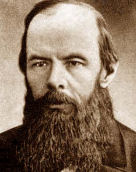 My favorite Russian novel. More than War and Peace and Crime and Punishment (also obviously great), it reveals the soul in the written word. My favorite Russian novel. More than War and Peace and Crime and Punishment (also obviously great), it reveals the soul in the written word. | |||||
| Thoreau's Works Henry David Thoreau | 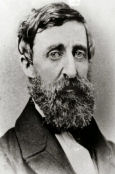 I have found Thoreau was influencing me even when I had a least thought of him - it is a pity that I waited until almost retirement to really come to appreciate him again. One of my best undergrad papers (for US Intellectual History I) was on Thoreau - applying the method of Eric Auerbach's Mimesis to Walden. Alas that paper is lost in the mists of history (and personal memory). Thank goodness Thoreau's are not! Here is one of the primary passages of Walden I explicated using Auerbach's methodology: I have found Thoreau was influencing me even when I had a least thought of him - it is a pity that I waited until almost retirement to really come to appreciate him again. One of my best undergrad papers (for US Intellectual History I) was on Thoreau - applying the method of Eric Auerbach's Mimesis to Walden. Alas that paper is lost in the mists of history (and personal memory). Thank goodness Thoreau's are not! Here is one of the primary passages of Walden I explicated using Auerbach's methodology:"My days in the woods were not very long ones; yet I usually carried my dinner of bread and butter, and read the newspaper in which it was wrapped, at noon, sitting amid the gree pine boughs which I had cut off, and to my bread was imparted some of their fragrance, for my hands were covered with a thick coat of pitch. Before I had done I was more the friend than the foe of the pine tree, though I had cut down some of them, having become better acquainted with it. Sometimes a rambler in the wood was attracted by the sound of my axe, and we chatted pleasantly over the chips which I had made."Here is the complete text of Walden (courtesy of Gutenberg.org). | |||||
| The Problem of Pain C. S. Lewis |  Lewis gives one of the best formulated Christian answers to the problem of evil. Lewis gives one of the best formulated Christian answers to the problem of evil. | |||||
| Man's Search for Meaning Viktor Frankl | 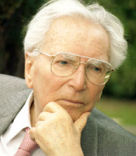 Psychotherapist Viktor Frankl spent years in a German concentration camp. His story of endurance and the lessons of humanity he learned there are deeply moving. Psychotherapist Viktor Frankl spent years in a German concentration camp. His story of endurance and the lessons of humanity he learned there are deeply moving. | |||||
| The Poetics of Space Gaston Bachelard | 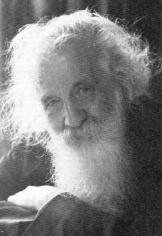 The beauty and insight of this book are profound. A mixture of poetry and transparent phenomenology, if such is not a contradiction. Let this small quote suffice for now: The beauty and insight of this book are profound. A mixture of poetry and transparent phenomenology, if such is not a contradiction. Let this small quote suffice for now:
| |||||
| I & Thou Martin Buber | 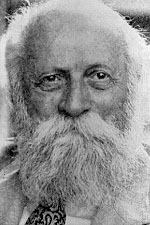 Here is the Stanford Enc. of Philosophy article on Buber. To the left is the man himself. Several of his works are available to borrow at the Open Library of the Internet Archive.< Here is the Stanford Enc. of Philosophy article on Buber. To the left is the man himself. Several of his works are available to borrow at the Open Library of the Internet Archive.< | |||||
| Being & Time Martin Heidegger |  With Kant's Critique of Pure Reason, one of the densest and sometimes most frustrating of philosophical texts. Will pay for the attempt however, if one is to understand the starting point of Heidegger's thought and his influence on so many, Christian and non-Christian alike. Some have said that this work is simply an amplification of Kierkegaard (in an even more opaque vocabulary). With Kant's Critique of Pure Reason, one of the densest and sometimes most frustrating of philosophical texts. Will pay for the attempt however, if one is to understand the starting point of Heidegger's thought and his influence on so many, Christian and non-Christian alike. Some have said that this work is simply an amplification of Kierkegaard (in an even more opaque vocabulary). | |||||
| Civilization Kenneth Clark | Such a great book - a history of art and other higher things...Clark's personal view reflects the essence of what "Western Civilization" means. Several of his works are available to borrow at the Open Library of the Internet Archive. | |||||
| Landscape into Art Kenneth Clark | A great work - the discovery (in the West) of nature through the medium of landscape. | |||||
| New Seeds of Contemplation Thomas Merton | This etching of St. Jerome (with lion) by Rembrandt reminds me of Merton, writing his books in solitude. The theme recalls that St. Jerome removed a thorn from the lion's paw, and, in gratitude, the lion stayed by Jerome's side and guarded him for the rest of his life. | |||||
| No Man is an Island Thomas Merton | It is difficult to select one work of Merton's to be representative, as over 50 published were published in his lifetime, but this early work captures the essence of his prayer-centered, meditative, spirituality. | |||||
| Dubliners James Joyce | How the same author could have composed these masterpieces of the short story narrative and later the appalling Ulysses, and impossible to read Finnegan's Wake novels (if one can call them that) is beyond me. My favorites from this collection are "The Dead" and "Araby." From Araby I memorized the closing line: "Gazing up into the darkness, I saw myself as a creature driven and derided by vanity and my eyes burned with anguish and anger." The closing paragraph of "The Dead" is the most hypnotic piece of prose I know of in the English language. Here is Dubliners, available courtesy of Gutenberg.org (available in multiple formats, including Kindle). | |||||
| Knoxville, Summer 1915 James Agee | 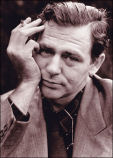 Prologue to "A Death in the Family." Here is the last paragraph of the prologue: "On the rough wet grass of the back yard my father and mother have spread quilts. We all lie there, my mother, my father, my uncle, my aunt, and I too am lying there.They are not talking much, and the talk is quiet of nothing in particular, of nothing at all in particular, of nothing at all. The stars are wide and alive, they seem each like a smile of great sweetness, and they seem very near. All my people are larger bodies than mine, quiet with voices gentle and meaningless like the voices of sleeping birds. By some chance, here they are, all on this earth; and who shall ever tell the sorrow of being on this earth, lying, on quilts on the grass, in a summer evening, among the sounds of night." Prologue to "A Death in the Family." Here is the last paragraph of the prologue: "On the rough wet grass of the back yard my father and mother have spread quilts. We all lie there, my mother, my father, my uncle, my aunt, and I too am lying there.They are not talking much, and the talk is quiet of nothing in particular, of nothing at all in particular, of nothing at all. The stars are wide and alive, they seem each like a smile of great sweetness, and they seem very near. All my people are larger bodies than mine, quiet with voices gentle and meaningless like the voices of sleeping birds. By some chance, here they are, all on this earth; and who shall ever tell the sorrow of being on this earth, lying, on quilts on the grass, in a summer evening, among the sounds of night." | |||||
| Confessions St. Augustine | 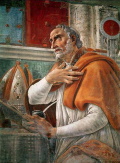 Great classic of Christian thought, comparable in power and profundity to the letters of Paul. "Thou hast prompted him, that he should delight to praise thee, for thou hast made us for thyself and restless is our heart until it comes to rest in thee." Available for download from Christian Classics Ethereal Library Great classic of Christian thought, comparable in power and profundity to the letters of Paul. "Thou hast prompted him, that he should delight to praise thee, for thou hast made us for thyself and restless is our heart until it comes to rest in thee." Available for download from Christian Classics Ethereal Library | |||||
| The Spirit of Medieval Philosophy Etienne Gilson | 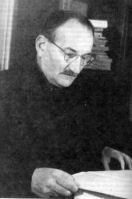 I know of no more lucid writer on philosophy than Gilson. His work, since it consists primarily of commentaries on Medieval thought, is now largely neglected, except perhaps in Catholic universities. This is sad, because not only is his prose a model of clarity, but the old saw that "those who cannot remember the past are condemned to repeat it" (George Santayana) is surely true of philosophy, if nowhere else. For Christian thinkers especially, his work is indispensable. Several of his works are available to borrow at the Open Library of the Internet Archive. I know of no more lucid writer on philosophy than Gilson. His work, since it consists primarily of commentaries on Medieval thought, is now largely neglected, except perhaps in Catholic universities. This is sad, because not only is his prose a model of clarity, but the old saw that "those who cannot remember the past are condemned to repeat it" (George Santayana) is surely true of philosophy, if nowhere else. For Christian thinkers especially, his work is indispensable. Several of his works are available to borrow at the Open Library of the Internet Archive. | |||||
| The Unity of Philosophical Experience Etienne Gilson | Would be one of the top ten philosophy books I would rescue from my burning house (God forbid!). A wonderful meditation on the history of philosophy and its recurring problems. After reading this book you say to yourself, "So this is why it is important to study philosophy." | |||||
| A History of Philosophy Frederick Copleston | 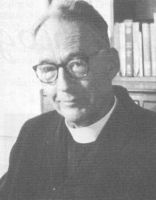 The classic, an impeccable treatment and very comprehensive. Nine-volumes covering the pre-Socratics to Sartre. One would wish it were a shade more engaging (as Gilson above), but still valuable. The classic, an impeccable treatment and very comprehensive. Nine-volumes covering the pre-Socratics to Sartre. One would wish it were a shade more engaging (as Gilson above), but still valuable. | |||||
| New Testament J.B. Phillips, Translator | Eminently readable, especially his translation of Paul's Letters. Available to read online. Also see his New Testament Christianity. | |||||
| Miracle at Midway Gordon Prange | Exciting story of the amazing (almost unbelievable - if it had not happened, no one would publish it as fiction, as it is too improbable) victory (and sacrifice) of the US Navy over the Japanese Imperial Navy that was a fundamental turning point in the pacific war. For those interested in history that is both personal and objective, there is hardly a better narrator than Prange. | |||||
| Citizen Soldiers Stephen Ambrose | Having met and talked with Ambrose a few short months before his death, I could feel in his handshake and in his eyes how sincerely he took his craft and his mission, namely to tell the story of the heroism and sacrifice of the young men who gave of their life so the world may not endure the evil of a world gone mad. Ambrose was the master of the blending of oral history with the bigger picture and his interviews of many hundred, yea, thousands of veterans marks his work as significantly different from the arm-chair historians whose only contact with the war was through other books. His work and that of the films "Saving Private Ryan" and "Band of Brothers," for which he was a technical advisor, made me understand some aspects of my father's personality and "soul" that I never understood while he was alive (he died in 1964, when I was 16). At the time I met Ambrose I also had the privilege of briefly being in the company of Carwood Lipton, of Band of Brothers fame. Lipton was to die only a month after that meeting and Ambrose less than a year after we had met. Both were great Americans. On the subject of Ambrose's plagarism and poor research: you can find these issues detailed in a number of places on the net. I have only this to say. It appears that as he did his work and achieved fame he did without the scrutiny of knowledgable editiors. He told me directly that he did not have any editors, save his wife, who, as an English major, made sure of his grammar, etc. I was shocked by this, as any work of a technical nature (and history - not just story telling - is one of the most technically challenging) requires other knowledgable minds to correct the errors, simplifications, omissions, and possible mis/non-attributions which are almost inevitable. Apparently Ambrose became a victim of his own myth - as he always used to say that he was really a storyteller at heart. Well it is one thing to tell a fiction, another to represent reality, which is altogether more difficult. Should this diminish our respect for his work? Not in my estimation. It does make it flawed, as the man himself was flawed, but who among us is without feet of clay? Imagine on the other hand what our collective non-participant memory of WWII would be like without Ambrose - significantly diminished - of this I have no doubt. | |||||
| One Day in the Life of Ivan Denisovich Alexander Solzhenitsyn | 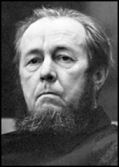 Alexander Solzhenitsyn profoundly impressed me in his books about the Soviet GULAG, in his novels Cancer Ward, First Circle, and others. The coming of the end of the Soviet Union and its version of communism has diminished his influence and stature, especially since his views on the future of Russia seem less in accord with Western inclinations, than did his critiques of its now deepening past. What has emerged in Russia is a country, which previously was repressed by its government, and now decaying from opportunistic and virulent crime on every level. Perhaps none of AS's work is in accord with the present, but certainly is in accord with the deepest appreciations of human suffering and the misery and nobility of the human spirit. The short novel "One Day..." is not dated by that fact alone. Alexander Solzhenitsyn profoundly impressed me in his books about the Soviet GULAG, in his novels Cancer Ward, First Circle, and others. The coming of the end of the Soviet Union and its version of communism has diminished his influence and stature, especially since his views on the future of Russia seem less in accord with Western inclinations, than did his critiques of its now deepening past. What has emerged in Russia is a country, which previously was repressed by its government, and now decaying from opportunistic and virulent crime on every level. Perhaps none of AS's work is in accord with the present, but certainly is in accord with the deepest appreciations of human suffering and the misery and nobility of the human spirit. The short novel "One Day..." is not dated by that fact alone. | |||||
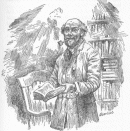 The Haunted Bookshop by Christopher Morley, 1919 The Haunted Bookshop by Christopher Morley, 1919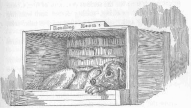 | 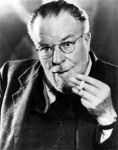 "The hunger for good books is more general and more insistent than you would dream. But it is still in a way subconscious. People need books, but they don't know they need them. Generally they are not aware that the books they need are in existence. "The hunger for good books is more general and more insistent than you would dream. But it is still in a way subconscious. People need books, but they don't know they need them. Generally they are not aware that the books they need are in existence.The human yearning for innocent pastime is a pathetic thing, come to think about it. It shows what a desperately grim thing life has become. One of the most significant things I know is that breathless, expectant, adoring hush that falls over a theatre at a Saturday matinee, when the house goes dark and the footlights set the bottom of the curtain in a glow, and the latecomers tank over your feet climbing into their seats----" "Isn't it an adorable moment!" cried Titania. "Yes, it is," said Roger; "but it makes me sad to see what tosh is handed out to that eager, expectant audience, most of the time. There they all are, ready to be thrilled, eager to be worked upon, deliberately putting themselves into that glorious, rare, receptive mood when they are clay in the artist's hand--and Lord! what miserable substitutes for joy and sorrow are put over on them! Day after day I see people streaming into theatres and movies, and I know that more than half the time they are on a blind quest, thinking they are satisfied when in truth they are fed on paltry husks. And the sad part about it is that if you let yourself think you are satisfied with husks, you'll have no appetite left for the real grain." | |||||
 The Meaning of Everything: The Story of the Oxford English Dictionary The Meaning of Everything: The Story of the Oxford English Dictionary | Wonderfully written - Winchester's prose is a thing of beauty - appropriate to this subject. Winchester describes the building of the OED is as one of the great achievements of human endeavor, as indeed it is. If you are interested in the English language, its depth and majesty, you will enjoy this book. | |||||
| Some Other Non-Computer-Related Books Recently (2-3 years) Read | ||||||
| The Second World War John Keegan | Magnificent one volume history by one of the best historians of WWII. Just to put put so much of this incredible crucible of human experience in one volume amazing in itself. | |||||
| Black May: The Epic Story of the Allies' Defeat of the German U-Boats in May 1943 Michael Gannon | Terrific book...if you have the slightest interest in WWII and especially in the Atlantic war. I knew Michael Gannon as Monsignor Michael Gannon, of St. Augustine's parish (the faculty/staff parish for University of Florida), Gainesville, FL. He later left the priesthood for married life - he was already a professor of history at UF. He delivered magnificent, erudite sermons and played a mean electric harmonica for folk mass. | |||||
| Coral Sea, Midway & Submarine Actions Samuel Eliot Morison | From the series, "History of United States Naval Operations in World War II." Very readable, as witnessed by the fact that, although familiar with the subject, I completed the book in record time for me - about a week for 300 pages. Several good maps including two large fold-outs - something you seldom see anymore. A classic history, dwelling on larger issues and command personalities, with here and there portraits of personal combat, unlike the depth of detail of Gordon Prange's "Miracle at Midway" for instance, but still worth reading. Currently out of print, but available used. | |||||
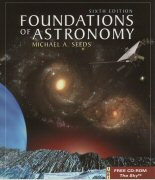 Foundations of Astronomy Foundations of AstronomyMichael Seeds | An almost ideal text - well written and comprehensive, with beautiful and plentiful diagrams, tables, photographs. If you have the slightest serious interest in astronomy, you will revel in this book. If I had such a book when in high school it would have changed my life - I would now be atop some mountain in Hawaii or Arizona! Or else be running simulations on supercomputers at Princeton! | |||||
 The Light at the Edge of the Universe The Light at the Edge of the Universe | In subject and tone, very much like "Lonely Hearts" below, and written in the same spirit, about 20% biography and 80% science - could almost have been by the same author. Based on many interviews and presence at astrophysical meetings. Also as with "Lonely", this book could greatly benefit from diagrams to illustrate concepts and color photography of interstellar objects. (It does have a considerable number of photographs of the principal researchers. But alas the publishers do not expend their precious capital on such excepting Hawking's works. For such you will have to go to Timothy Ferris' Galaxies or better, a standard astronomy textbook. I recommend Michael Seed's Foundations of Astronomy, detailed above. | |||||
 Lonely Hearts of the Cosmos: The Story of the Scientific Quest for the Secret of the Universe Lonely Hearts of the Cosmos: The Story of the Scientific Quest for the Secret of the Universe | About 30% biography and 70% science - very well written, engaging, novelistic. Based on many interviews and presence at astrophysical meetings. Some points that should be corrected in any new edition: more pictures especially of crucial celestial objects (Cepheid variables, quasars, etc.), preferably in color next time round, drawings to illustrate concepts, and more careful documentation about many of the characters mentioned. Frequently the author uses the last name of a scientist from out the blue and does not say who he is (not counting the big boys, Hawking, Sandage, etc.). | |||||
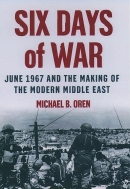 Six Days of War: June 1967 and the Making of the Modern Middle East Six Days of War: June 1967 and the Making of the Modern Middle East | Eye opening history of the Six Day War - sheds great light on contemporary middle-east dilemmas. | |||||
 Albert Einstein : Creator & Rebel Albert Einstein : Creator & Rebel | Written by a collaborator of AE, Banesh Hoffman, and AE's secretary Helen Dukas,it reads easily and interestingly. One of the best features of the book are its 96 B&W photos and illustrations. One comes away with a sense of Einstein as a humble rebel - humble in the face of the cosmos, rebellious against the given scientific opinion in his early days, and forever in quest of a "theory of everything." Not surprisingly, the human portrait of AE is not much elucidated by the effort. But then when do we ever capture the person in words? (See Richard Westfall's comment about Newton below.) The book is about 30% biography and 70% science. This is a biography of AE's ideas, a philosophical biography. All in all, worthwhile. | |||||
 E=mc2: A Biography of the World's Most Famous Equation E=mc2: A Biography of the World's Most Famous Equation | Excellent and easy to follow "biography" of the equation, with stories being told along the way of the interesting characters making significant contributions to the advancement of physics, including three little known women. Besides the history of the contributions, perhaps the most interesting part of the book for me was the explanation of the meaning of the "c" value of the equation - why should mass and energy be related by the speed of light and why is it squared? Highly recommended. | |||||
| Non-Computer Related Books Currently on the Back Burner Abandoned 100-200 pages in...perhaps when I get more time... | ||||||
| Information : The New Language of Science by Hans Christian Von Baeyer | Baeyer addresses the question posed, by among other people, John Archibald Wheeler, how IT is related to BIT or "how is our understanding of the world (its meaning) related to its objective reality." An essay in the philosophy of science. | |||||
| Warmth Disperses and Time Passes : The History of Heat by Hans Christian Von Baeyer | Baeyer traces the course of the history of thermodynamics - well-written. | |||||
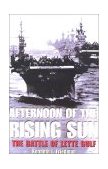 Afternoon of the Rising Sun: The Battle of Leyte Gulf Afternoon of the Rising Sun: The Battle of Leyte Gulfby Kenneth I. Friedman | Surprisingly well-written account of the largest sea battle in history (actually a series of air/sea engagements over several days). Pity that so few Americans are aware of the heroism and sacrifice that US Navy sailors and airmen displayed in defeating the last major offensive operation by the Japanese navy in WWII. An incredible story, that ranks with the Battle of Midway in bravery, tactical skill, luck, and suspense. Friedman, a retired IBM executive, and not a professional historian, has done a creditable job with his subject. Understandably some of the narrative is uneven, starting over and repeating story lines already completed, and repetition of banal phrases, as for instance, using the figure of speech "denizens of the deep" for submarines. Despite these limitations, and a certain feeling of being at second hand remove, the battle itself is such a riveting story that it still is worth the time. | |||||
 Stalin : The Court of the Red Tsar Stalin : The Court of the Red Tsarby Simon Montefiore | Bought this book based on Montefiore's appearance on Booknotes, the CSPAN interview program. The Booknotes intro has this to say: "In a seamless meshing of exhaustive research, brilliant synthesis and narrative élan, Simon Sebag Montefiore chronicles the life and lives of Stalin's court from the time of his acclamation as 'leader' in 1929, five years after Lenin's death, until his own death in 1953 at the age of seventy-three. Through the lens of personality - Stalin's as well as those of his most notorious henchmen, Molotov, Beria and Yezhov among them - the author sheds new light on the oligarchy that attempted to create a new world by exterminating the old." Just started this one. | |||||
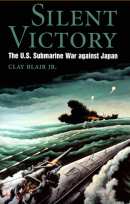 Silent Victory: The U.S. Submarine War Against Japan Silent Victory: The U.S. Submarine War Against Japan | Dramatic retelling, with incredible detail, of the story of US subs in the Pacific in WWII. Considering our awful stumbling at the beginning of the war, tactically, strategically, and technically (we did not have reliable torpedos for almost two years), it is a remarkable story of how the USN silent service came to be so expert later in the war as to almost completely isolate Japan from her sources of raw materials, and thus bring the war to a close. | |||||
| Protestant Thought Before Kant | Excellent survey of Protestant religious thought before Kant (that is, from the 15th until the end of the 18th centuries). Gives insight into the continuity with the pious traditions, as well as the revolutionary aspects of the upheaval in Western religious life. | |||||
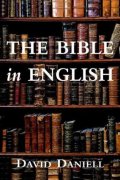 The Bible in English: Its History and Influence The Bible in English: Its History and Influence | Tries to remedy our ignorance of the origins and significance of the English Bible. As far along as I have gotten, it is very illuminating. I expect to learn a great deal from this book. | |||||
 A Short History of Nearly Everything A Short History of Nearly EverythingBill Bryson | Lots of book titles with "everything" in them these days, but despite the hubris implied in the title, Bryson, always readable and fun, perhaps does the best one can expect to cover the groundwork of 20-21st century science under one cover in a "humanistic" conveyance. | |||||
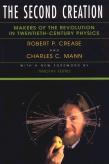 The Second Creation : Makers of the Revolution in Twentieth-Century Physics The Second Creation : Makers of the Revolution in Twentieth-Century Physics | Written by a professor of philosophy and a science writer. Significant portions are based on interviews with scientists engaged in research or else surviving retired luminaries from the early days of quantum mechanics and elementary particle research. The most interesting parts so far are the vignettes of the relationships between the breakthrough generation of quantum theorists and the story of their epiphanies - for instance the discovery of the applicability of matrix methods to quantum mechanics. What is missing for me are photos of the principal characters (which you can find online) and illustrations, i.e., diagrams, of the ideas. Still a very enjoyable journey. | |||||
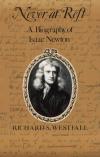 Never at Rest : A Biography of Isaac Newton Never at Rest : A Biography of Isaac Newtonby Richard Westfall | Superbly written. As an example: "One way or another, the disparity between the mathematics of the heavens and their physics would have to be resolved; until it was, a gaping hole leered at natural philosophers from the very heart of their new science." And this: "The utility of biography, Dr. Johnson argued, rests on the fact that we can enter by sympathy into situations in which others have found themselves.... I must confess that twenty years devoted to the biography of Newton have not in my case confirmed Dr. Johnson's dictum. The more I have studied him, the more Newton has receded from me.... He has become for me wholly other, one of the tiny handful of geniuses who have shaped the categories of the human intellect, a man not reducible to the criteria by which we comprehend our fellow human beings...." More after I finish the last 800 pages. | |||||
 The Universe in a Nutshell The Universe in a Nutshell | Starts off easy enough and then gets challenging by about page 50. Beautiful illustrations, beautiful thinking. | |||||
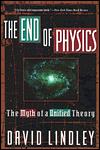 The End of Physics : The Myth of a Unified Theory The End of Physics : The Myth of a Unified Theory | Starts with the fundamental question, "How can mathematics model reality?" Just started this one. Well written. | |||||
 Dreams of a Final Theory Dreams of a Final Theory | Just started this one, too. Said to be an opposed point of view to Lindley's. Well written. | |||||
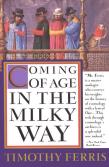 Coming of Age in the Milky Way Coming of Age in the Milky Way | All Ferris' work is impeccable. First published in 1988, this is a classic in the history of science. Superbly written. | |||||
 How to Write: Advice and Reflections by Richard Rhodes How to Write: Advice and Reflections by Richard Rhodes | A master of English prose. Author of the classic "The Making of the Atomic Bomb." | |||||
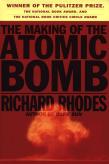 The Making of the Atomic Bomb The Making of the Atomic Bomb | ||||||
 Newton's Gift : How Sir Isaac Newton Unlocked the System of the World Newton's Gift : How Sir Isaac Newton Unlocked the System of the World | Got mixed reviews on Amazon. Sometimes his prose is less than clear. I am giving him a chance to prove his critics wrong, partly because of the subject and partly on account of the $14 I parted with for this book. | |||||
 A Beautiful Mind: The Life of Mathematical Genius and Nobel Laureate John Nash A Beautiful Mind: The Life of Mathematical Genius and Nobel Laureate John Nash | Perhaps tries to do too much - detailed bio, schizophrenia, mathematics of game theory. I am having a tough time getting finished. | |||||
 The Importance of Living by Lin Yutang
The Importance of Living by Lin Yutang